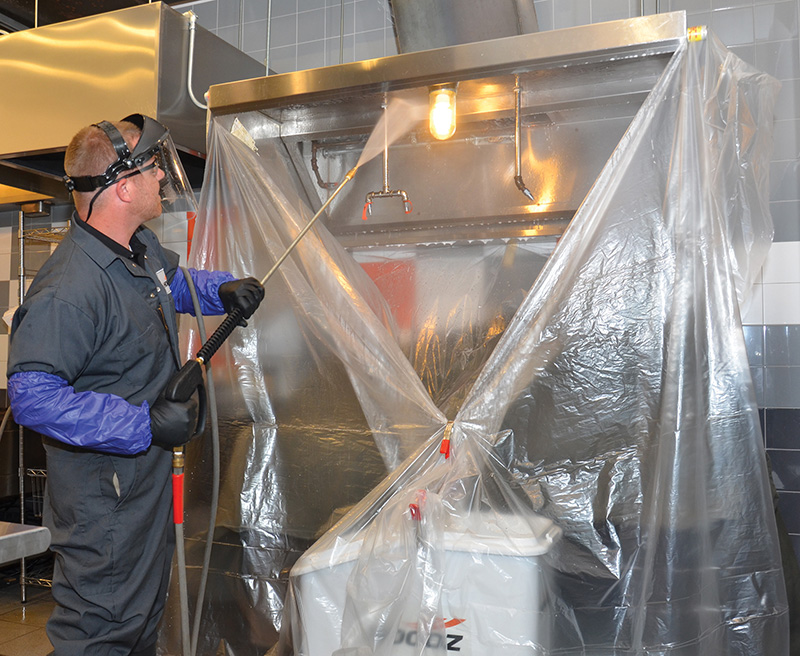Reduce the risks of restaurant fires by maintaining a clean, sound kitchen.
By Breann Loffing
In a hectic restaurant environment, kitchen fires can start in the blink of an eye and quickly spread throughout the entire facility. In fact, an estimated 5,900 restaurant fires are reported to U.S. fire departments each year, resulting in $172 million in property loss, according to the National Fire Protection Association. The main kitchen fire culprit: failure to clean.
These eye-opening statistics highlight the critical importance of sustaining a tidy kitchen. For facility managers who are largely responsible for building safety, being aware of the best practices for maintaining a safe environment for employees and customers is a necessity. There are a number of easy fire prevention measures that facility managers can implement to lower the risk of a kitchen fire without interfering with their busy schedules. Simple improvements and adjustments can be made throughout the kitchen, such as having the proper fire prevention equipment available and adopting a regular cleaning schedule.
Facility managers should consider implementing the following precautionary measures in an effort to increase fire safety in the kitchen:
1. Remove grease buildup frequently
When working in a commercial kitchen, grease buildup is inevitable. While it may be difficult to keep a kitchen 100% grease-free, employees should be trained on how to recognize and cleanup excess grease. Grease buildup is incredibly dangerous as it can easily ignite when exposed to a flame or high heat. As such, it is important that facility managers instruct staff to regularly clean walls, ranges, work surfaces, grills, fryers, hoods and other areas of the kitchen that could be harvesting grease. It is also equally important to have commercial kitchens regularly cleaned by a professional to access those hard-to-reach spaces, which will keep a kitchen up to code while concurrently reducing risk of fire and improving overall kitchen safety.
2. Don’t forget to take out the trash
Preventing a commercial kitchen fire can be as simple as taking out garbage and removing items from the kitchen that may fuel a fire. It is helpful to set a regular reminder to clear the kitchen of debris, packaging, clutter and any other flammable materials at least three times a day, or when a trash receptacle reaches full capacity. When the trash is gathered, be sure to immediately put all waste in a dumpster or other trash container that is far away from any cooking equipment. To further reduce the risk of fires outside the kitchen, regularly clean dumpster pads and waste areas to remove built up grease and maintain cleanliness.
 3. Clean the kitchen exhaust system regularly
3. Clean the kitchen exhaust system regularly
A properly cleaned and compliant kitchen exhaust system means cleaning beyond what is immediately visible. A professional should be hired on a regular basis to conduct a deep cleaning of the kitchen hoods, ducts and fans to remove grease and improve ventilation. The National Fire Protection Association Standard-96, the standard for outlining preventative fire safety requirements in commercial cooking operations, recommends that kitchen exhaust systems be professionally inspected at least once per year, with some kitchens that use solid fuel such as wood or charcoal cooking methods, requiring monthly inspections. It is essential to carefully select a professional that will examine and thoroughly clean a kitchen exhaust system up to these standards in order to ensure compliance and reduce risk.
4. Equip the kitchen with fire prevention supplies
Take time to evaluate the fire prevention tools and resources that the kitchen currently has available and identify areas for improvement. This could include upgrading a sprinkler system, purchasing more fire extinguishers, and installing an automatic fire-suppression system. These non-water based automatic extinguishing systems dispense chemicals to suppress flames and may automatically shut down fuel and electrical supply to cooking equipment. It is also very important to ensure your fire-suppression tools and resources are regularly maintained and compliant. Schedule time with kitchen managers to assess the current fire prevention strategy and address any immediate needs or recommendations.
5. Train the kitchen staff on fire response
Kitchen staff should be well versed in fire response. Make sure that staff is educated on how to use a fire extinguisher, the proper techniques for stopping a fire and the details of the kitchen’s emergency action plan. This doesn’t just apply to the cooking staff. Any employee that handles cleaning products should be aware of fire response protocol and simple fire prevention tips, such as not leaving flammable cleaning chemicals near kitchen equipment. All cleaning supplies should be kept in a cupboard or closet away from cooking areas. These toxic cleaning supplies are not only dangerous if they accidently get into the food served to patrons, they are also a major fire hazard.
Restaurant building fires can easily cause great personal and financial loss. Luckily, there are tools and resources available that allow those who work in a commercial kitchen to minimize the risk of a dangerous fire. With the implementation of these suggested tips for kitchen safety and fire prevention, facility managers will be able to create a safer and cleaner restaurant for their staff, patrons and themselves.
— Breann Loffing, CFE, is the vice president of franchise operations at HOODZ International, the nation’s largest and most reputable commercial kitchen exhaust and oven cleaning franchise. Headquartered in Ann Arbor, Mich., HOODZ is owned by BELFOR Franchise Group, a multi-concept franchise system of BELFOR Holdings, Inc. Email the author at [email protected].
